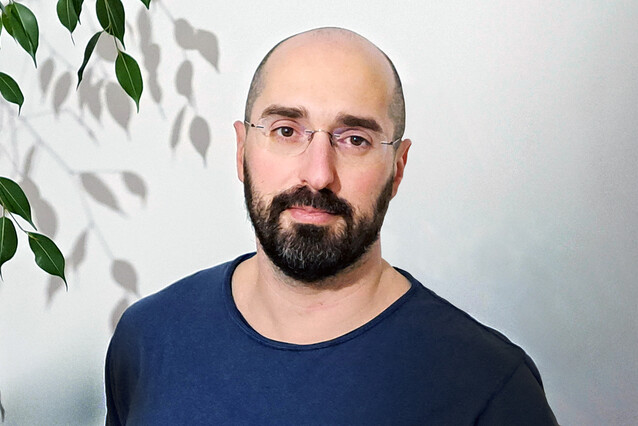Custom protein assemblages help different promoters initiate gene transcription
Leonid Serebreni, an alumnus of the lab of Alexander Stark, completed his PhD in 2022. During his doctoral studies in the Vienna BioCenter PhD Program, he investigated how proteins that associate with RNA polymerase recognise different types of promoters to launch gene transcription. His latest findings are now published in The EMBO Journal.
In order to produce proteins, a cell first needs to transcribe DNA into an mRNA template. How does gene transcription begin?
The transcription of protein-coding genes is switched on by two types of non-coding elements in our DNA that work together: promoters and enhancers. RNA polymerase II, the enzyme that produces mRNA, needs to recognise the promoter region and start the process there. Promoters are the gateway to transcription, but on their own they only start it at very low levels. To gain biologically relevant levels of transcription initiation rates, enhancer regions – which can be almost anywhere in the genome – act as platforms where transcription factors and co-factors communicate activating cues back to the promoter to increase the transcription rates. There are probably many ways for this to happen, but we currently don’t understand much of it.
There are several types of promoter regions. Can you tell us more?
In our lab, starting in 2015, several students found that not all promoters and enhancers are the same, but that promoters and enhancers can be classified into two broad categories: developmental and housekeeping sequences. Developmental promoters are often the promoters of genes that are expressed in specific cell types or at a specific developmental stage. Housekeeping promoters are the promoters of genes that are expressed at large spatial and temporal scales, and often of genes that perform routine functions in the cell. The promoters and enhancers of developmental types and housekeeping types don't often communicate with each other. For example, if you put a developmental enhancer right next to a housekeeping promoter, they won’t be able to activate transcription to a significant level.
What aspects of the initiation of transcription are still mysterious?
Developmental and housekeeping promoters seem to activate transcription in different ways, but we don’t really know how. If you pinpoint the first transcribed nucleotide within developmental and housekeeping promoters, you’ll see that developmental promoters have what we call a focused initiation pattern, meaning that RNA polymerase II initiates transcription at a very precise location. However, in housekeeping promoters, we see what we call a dispersed transcription initiation pattern, where RNA polymerase II starts working at one of many positions within a hundred-base pair window or so. We’ve been lacking an explanation as of how this happens. How does this diversity happen? How does polymerase engage with different promoters? In my project, the first thing I wanted to investigate were the proteins that bind distinct promoters in the Drosophila genome. For this, I implemented novel biochemical assays that were outside our lab’s comfort zone. Everything began to unravel downstream of that question.
How does RNA polymerase II recognise promoters in a big genome?
Previous studies have shown that RNA polymerase II doesn't arrive by itself at promoter regions, but rather it's assembling with other molecules, as part of a complex that's called the RNA polymerase II preinitiation complex (PIC). Among members of this complex are the general transcription factors or GTFs, which help guide RNA polymerase II to promoter regions. It's not clear how most of the GTFs achieve this, but we investigated a few important ones.
What did you find?
We found that the canonical PIC was preferentially bound to developmental promoters, but not housekeeping promoter types. One possible explanation is that the proteins that bind promoters of different types differ. By rapidly depleting various proteins and recording any effect on transcription, we wanted to clarify what’s going on.
What did your experiments show?
Our experiments suggest that some GTFs are universally required for promoters to function properly, while some others are only needed for subsets of promoters. Developmental promoters DNA associate with the usual PIC, whereas housekeeping promoters DNA recruit other factors. We even found that some factors are associated with subsets of promoters that intersect with both developmental and housekeeping types. By depleting these factors one by one, we demonstrate that they function at different promoter types, though sometimes in a redundant manner, meaning that one can compensate the absence of the other. The logical next step will be to solve the biochemical structure of these factors and see how that relates to their role for the initiation of transcription.
If you had to mention one thing that made this study possible, what would it be?
The IMP’s Proteomics Facility and their very sensitive instruments helped us figure out which proteins are bound to which promoter sequences. This fruitful collaboration allowed us to repeat our assay with various conditions to identify the settings that work. This paper wouldn’t have happened without them, and without my co-authors.
What happened after you finished your PhD?
I defended my PhD in February 2022, and then joined the lab of Jan Philipp Junker at the Max Delbrück Center in Berlin for my postdoctoral research. I have now switched fields and I’m investigating how changes in chromatin structure influence cell fate decision during development in zebrafish.
Original publication
Leonid Serebreni, Lisa-Marie Pleyer, Vanja Haberle, Oliver Hendy, Anna Vlasova, Vincent Loubiere, Filip Nem?ko, Katharina Bergauer, Elisabeth Roitinger, Karl Mechtler, Alexander Stark: "Functionally distinct promoter classes initiate transcription via different mechanisms reflected in focused versus dispersed initiation patterns". The EMBO Journal, DOI: 10.15252/embj.2023113519.
Further reading
About the Vienna BioCenter PhD Program
Are you interested in a world-class career in molecular biology? Find out more about the Vienna BioCenter PhD Program: https://training.vbc.ac.at/phd-program/
